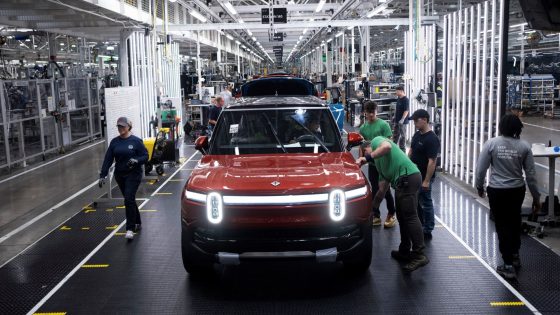Rivian Automotive is making headlines as it adjusts its 2025 targets for vehicle deliveries and capital spending. The electric vehicle manufacturer, known for its all-electric trucks and SUVs, faces challenges from President Donald Trump’s tariffs, impacting its operational outlook. On May 7, 2025, Rivian reaffirmed its earnings expectations despite these hurdles, highlighting the ongoing uncertainty in the global trade environment.
- Rivian adjusts 2025 delivery targets downward
- Capital expenditures revised upward to $1.8-$1.9 billion
- Global trade impacts consumer sentiment and demand
- Achieved second consecutive quarter of gross profit
- Ended Q1 with $8.5 billion in liquidity
- Lucid Group reports mixed first-quarter results
The company now anticipates delivering between 40,000 and 46,000 vehicles, a decrease from its previous estimate of 46,000 to 51,000 units. Additionally, Rivian’s capital expenditures are set to rise to between $1.8 billion and $1.9 billion. As the market reacts, how will these adjustments influence consumer sentiment and demand for electric vehicles worldwide?
Rivian’s situation raises questions about the broader implications for the electric vehicle sector. As tariffs and trade policies evolve, how will other manufacturers adapt? Key points include:
- Increased production costs may affect pricing strategies globally.
- Consumer demand could shift based on perceived value and availability.
- Joint ventures, like Rivian’s with Volkswagen, may become crucial for survival.
- Competitors like Lucid Group are also recalibrating their forecasts in response to market conditions.
As Rivian navigates these challenges, stakeholders must remain vigilant. The future of electric vehicles hinges on adaptability and strategic partnerships that can weather economic storms.

































